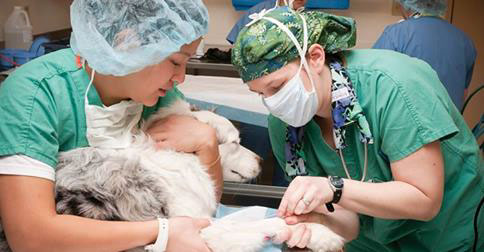“The poor dog, in life the firmest friend. The first to welcome, foremost to defend,” wrote the famous poet Lord Byron. A pet owner naturally desires to protect and defend such a loyal friend, especially when Fido must undergo surgery with general anesthesia. Here are six important facts to know about your dog and anesthesia.

Anesthesia is safe
Though there is risk involved with any medical procedure, 99.85% of animal surgeries are completed with no complications from anesthesia. Moreover, most of the reactions to the

medicine are very mild and non-threatening to the pet’s life. “Overall, for healthy dogs and cats, the mortality rate is approximately 0.05 to 0.1% and is probably around 1-2% for sick dogs and cats,”confirms Dr. Truchetti Geoffrey, a board-certified anesthesiologist and contributing author at Dispomed.
Preparation is important
While pet surgery is safe, it is important that an owner prepares the family dog for the procedure. First, remove all food and water from the pet the night before surgery. This will prevent the dog from aspirating if the anesthesia nauseates the pet.
 Second, provide the veterinarian with the dog’s medical history. “A thorough history of current and past medical problems can provide valuable information about your pet’s physical condition,” recommends Robert D. Keegan, associate professor of Veterinary Clinical Sciences at Washington State University.
Second, provide the veterinarian with the dog’s medical history. “A thorough history of current and past medical problems can provide valuable information about your pet’s physical condition,” recommends Robert D. Keegan, associate professor of Veterinary Clinical Sciences at Washington State University.
Third, request a pre-surgical exam. This will enable the veterinarian to perform important tests such as an electrocardiogram to measure heart and lung function, a blood test to check kidney and liver function, and an electrolyte test to probe for dehydration.
Vet the vet
Though a pet-owner may expect the dog’s family veterinarian to do the surgery, it is prudent to make sure the vet is qualified. First, the doctor should have the necessary  training for surgery, which requires a year’s internship and three year’s residency after vet school. Second, the surgeon should also be board-certified, which means the vet has passed the American College of Veterinary Surgeons’ examination.
training for surgery, which requires a year’s internship and three year’s residency after vet school. Second, the surgeon should also be board-certified, which means the vet has passed the American College of Veterinary Surgeons’ examination.
Review the procedure
A pet owner should also ask the surgeon about normal surgical procedures to ensure the dog’s safety. There are a few basic measures that a vet should employ to minimize risks. First, a surgeon should be assisted by a veterinary technician who is trained to keep a check on the anesthetized dog’s vital signs.
Second, it is important that the surgeon has a post-surgery plan for the pet. A study by British anesthesiologist David Brodbelt discovered that the greatest danger of life-threatening anesthesia complications is after surgery. “Greater patient care in the postoperative period could reduce fatalities,” he concluded.
Examine the facility
A wise pet owner should also investigate the type of facility used for surgery. The American Animal Hospital Association recommends that the vet should have an area that is used only for surgery. “To prevent post-surgical infections and cross-contamination, surgeries are performed in a room used only for sterile surgical procedures,” advises the AAHA website. The surgical suite should be equipped with a heart-rate monitor, an electrocardiogram, blood pressure monitor, pulse oximetry—all necessary to ensure the pet is tolerating the anesthesia well.
The surgical suite should be equipped with a heart-rate monitor, an electrocardiogram, blood pressure monitor, pulse oximetry—all necessary to ensure the pet is tolerating the anesthesia well.
Be aware of risk factors
Though modern anesthesia is normally safe, a pet owner should be aware of factors that increase the risk for the family pet. First, a dog’s age can increase the danger of anesthesia. There is an increased risk of complications with older animals. Second, an overweight dog can have trouble under anesthesia due to breathing difficulties. Finally, certain breeds are more prone to serious issues while anesthetized. These include short-snout breeds like Pekingese, Pugs, and Boxers, which have constricted nasal passageways.

“Dogs’ lives are too short. Their only fault, really,” wrote author Agnes Sligh Turnbull. Fortunately, with careful planning a pet owner can help his or her dog undergo surgical anesthesia successfully and enjoy a long and good life.
================================================================================================================































